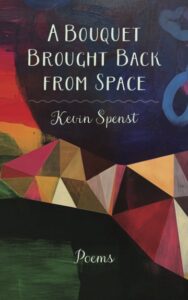Where ‘words wander about’
A Bouquet Brought Back from Space
by Kevin Spenst
Vancouver: Anvil Press Publishers, 2024
$18.00 / 9781772142259
Reviewed by Steven Ross Smith
*

Kevin Spenst, in his latest poetry collection, dispenses, speculates, and apprehends, through ranging terrains—self, relationships, and semantic antics, often with inventive surrealities.
The book lives up to its title, suggesting a multi-coloured bouquet offering—a flush of varied blossoms in an exuberant scramble of forms, diction, and thought that digs well beyond the common garden varieties. As Spenst (Hearts Amok: A Memoir in Verse) orbits through a linguistic cosmos he grabs petals and poetic shapes from disparate regions, near and distant—free verse, prose poems, Q&A, couplets, thin and husky verse, word games, and more.
I’ve met Vancouver-based Spenst in person twice where I’ve witnessed what seems to be his intrinsic character trait—intense and enthusiastic energy. These are reflected in his diverse and ebullient configurations.
As flowers respond to weather, Spenst offers a report in “It Will Rain Like Rods on the Hillside in Sweden.” The poem is surrealistic fun, with alliterative climatic chimes: “… In Nantes, it’s currently / raining nails, in Grenoble it’s grenouilles / ropes in Reims….”
Though the book’s sixty-eight individual poem offerings are not sectioned by headings or numbers, some clusters do appear. An affective one is a sequence of love poems wherein Spenst strives successfully against cliché via inventive metaphor and phrasings, in such lines as “When my fingers study your pleasure principle / and your back arches in a new hypothesis / When your tongue is pure birdsong / and my right leg is the swooning branch / When my veins are rivers of longing….” The formal and rhythmic effect of the repetition of “When…” at the start of each phrase and the novel descriptors captivate the ear, the imagination, then the senses—the sensitive and sensual sites of amour.

Set up by a quote from David Suzuki, another array emerges—a short series of prose poems, eight in all, a burst, contained in rectangles, and linked by phrases taken from the last line of the previous poem to weave into the first line of the next: “…promises the sun’s shiny tangerines // on a blue plate //// On a blue plate, I place that cloud from the sky.…” The trope holds Spenst’s forward-churning momentum, to a degree, in check, then lets it loosen to include versed reflections on death and rejuvenation before the ‘stumble’ in a breakdown of the method, ending with the Suzuki text aired out by erasure.
Many individual poems are prefaced with epigraphs, lines from R. M. Rilke, a recurring favourite; others include Jen Currin, Roy Miki, and Maxine Gadd, and even poet and jazz man Sun Ra, as prompts for the poet’s expanded reflections. As well, Spenst enhances linguistic texture by including phrases in German, French, Spanish, Sinhalise, and more—“Nachthimmel,” “la chaleur de leur splendeur,” and so on—exotics in the array.
An outlier in the gatherings is “Madlib Shrine of the Holy Mountain”—a single poem-invitation, cryptic-prompt style—to fill in blanks in the versed lines. It might be fun, yet it also feels like a stray in the assembly. Or perhaps I’m just a cryptography curmudgeon.
It seems to me that Kevin’s book documents his research into myriad formal and semantic possibilities, engaging in a practice that endeavours to stretch poetic narratives and structures. I can relate to this interest and have made such forays myself, assembling exercises and fragments while lacking an overall vision; this (as I now see in my own work) can become excessive, perhaps scattered, within one manuscript. A danger is that cohesiveness can be lost, that there may be too much, that is, the abundance can overwhelm the arrangement.
This book is Spenst’s vase, straining to hold the many ornate possibilities, full with elaborate shape and colour, and charged with unpredictability. To quote the poet himself: “words wander about / a changing body and city.” Disorientation and defamiliarization are welcomed, yet in his methods’ wander, I sometimes wonder where I am, which bouquet anchors my attention enough to make me pause and inhale the scent, see the individual petals, get my bearings. Nonetheless, Spenst’s brimming compositions fascinate.
*

Steven Ross Smith, Banff Poet Laureate 2018-21, loves live music and walking on beaches and in forests. He is less enthralled, though consistent, with his physiotherapy-induced workouts. His poetic work often juxtaposes disparate threads, as in his seven book series fluttertongue.His fourteenth book is Glimmer: Short Fictions. Three collaborative chapbooks have appeared with Jackpine Press; The Green Rose, a collaboration with Phil Hall, has appeared from above/ground press. Over many years Smith has migrated westward from Toronto to Saskatoon to Banff, and he now lives and writes in the region of the W̱SÁNEĆ peoples, Victoria, BC. [Editor’s note: Smith recently reviewed Eimear Laffan and Tim Lilburn for BCR.]
*
The British Columbia Review
Interim Editors, 2023-25: Trevor Marc Hughes (non-fiction), Brett Josef Grubisic (fiction)
Publisher: Richard Mackie
Formerly The Ormsby Review, The British Columbia Review is an online book review and journal service for BC writers and readers. The Advisory Board now consists of Jean Barman, Wade Davis, Robin Fisher, Barry Gough, Hugh Johnston, Kathy Mezei, Patricia Roy, Maria Tippett, and Graeme Wynn. Provincial Government Patron (since September 2018): Creative BC. Honorary Patron: Yosef Wosk. Scholarly Patron: SFU Graduate Liberal Studies. The British Columbia Review was founded in 2016 by Richard Mackie and Alan Twigg.
“Only connect.” – E.M. Forster
One comment on “Where ‘words wander about’”